Fox News Flash top headlines for April 23
Fox News Flash top headlines for April 23 are here. Check out what's clicking on Foxnews.com
The oldest southern sea otter in a zoo or aquarium died on Monday in California, according to the aquarium where he was kept.
Charlie was 22 years old when he died at the Aquarium of the Pacific in Long Beach.
THREE RARE RIVER OTTERS DISAPPEAR FROM NORTH CAROLINA ANIMAL SANCTUARY, OFFICIALS SAY
“It is with a heavy heart that we share the news that our sea otter Charlie passed away this morning,” the aquarium tweeted, in part, on Monday.
The aquarium posted a series of tweets about the beloved sea otter, who celebrated his 22nd birthday on March 2 by eating colorful seafood cupcakes.
According to the aquarium, Charlie is only the second sea otter to reach 22 years old. Male southern sea otters typically only live 10 to 14 years in the wild.
“Known for his intelligence and easy-going disposition, Charlie could often be seen sucking his paw while relaxing on exhibit,” one tweet from the aquarium said. “In addition to his role as an animal ambassador living at the Aquarium, Charlie also contributed to scientific research.”
The aquarium went on to say that Charlie “was the first otter in the world to give a voluntary blood sample” and that he participated in a study about how sea otters perceive sound from 2011 to 2013.
SOMEONE IS KILLING CALIFORNIA’S PROTECTED SEA OTTERS
In a post about Charlie, the aquarium said he was orphaned in 1997 during the El Niño storms. He spent some time at a sea otter rescue program, but experts decided he couldn’t live on his own.

Charlie, the oldest southern sea otter held by any zoo or aquarium, died Monday, April 22, 2019 at the age of 22, at the Aquarium of the Pacific in Long Beach, Calif. (Robin Riggs/Aquarium of the Pacific via AP)
He moved in at the Aquarium of the Pacific in 1998 before it was opened to the public, the aquarium said.
The aquarium lost another otter in January. Brook, a female, was 21 when she died of congestive heart failure.
California's sea otters are considered threatened. Hunting in the 18th and 19th centuries nearly wiped them out.
Conservation efforts have brought the population to about 3,000 but otters still face threats such as pollution and habitat loss.
The Associated Press contributed to this report.


